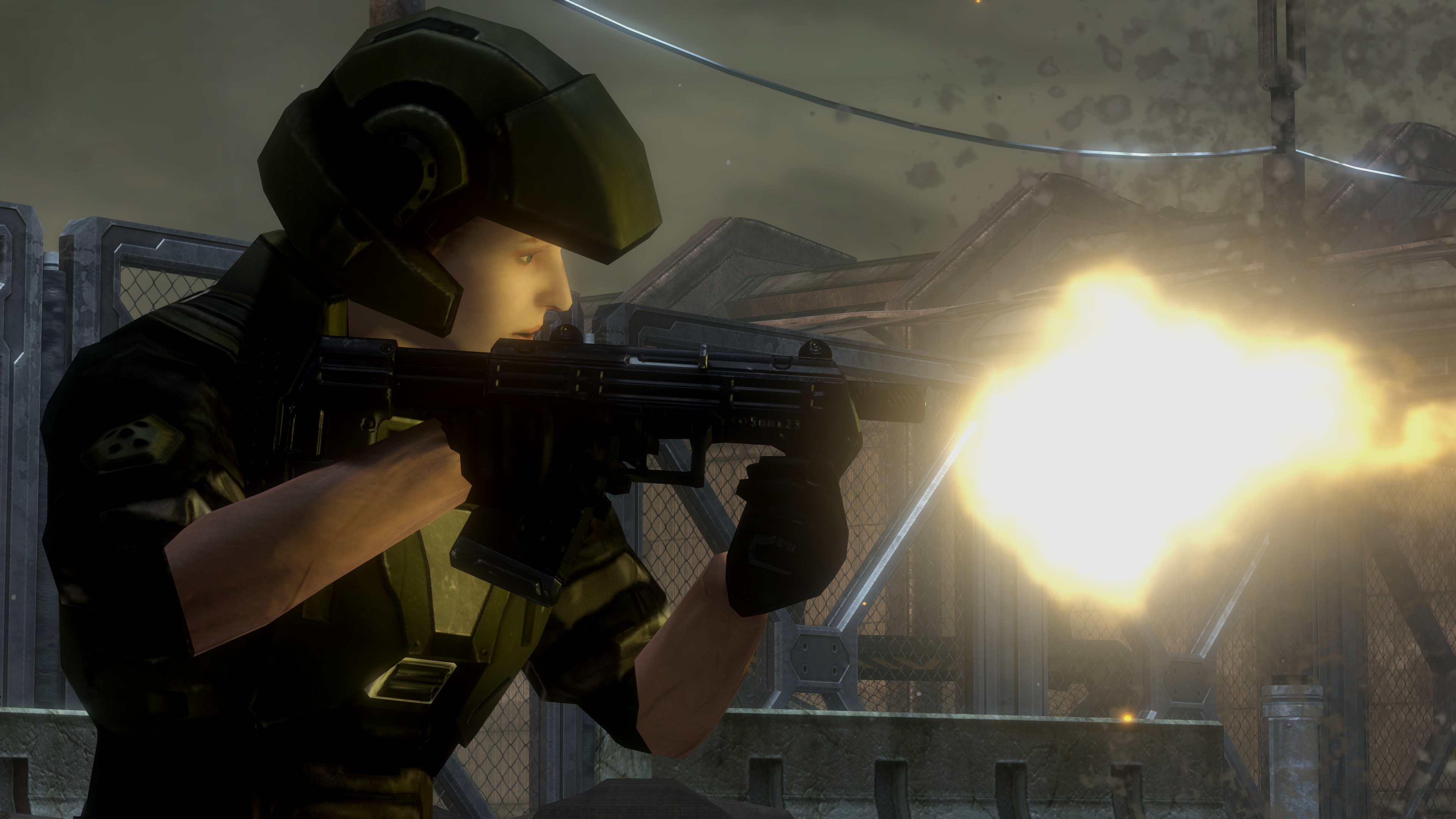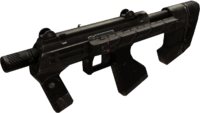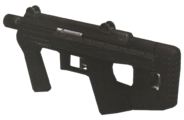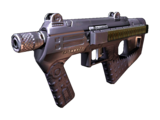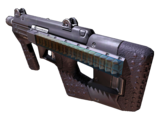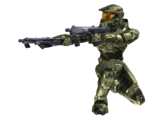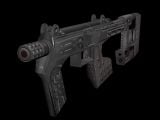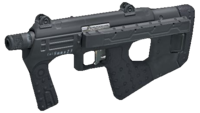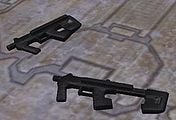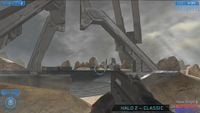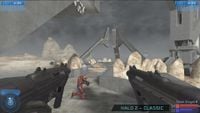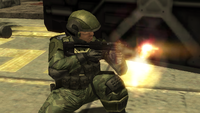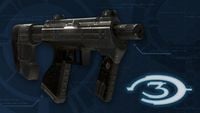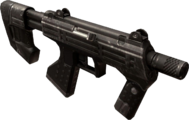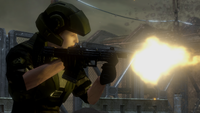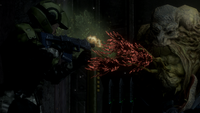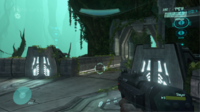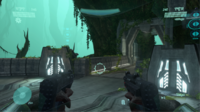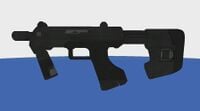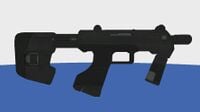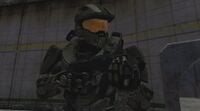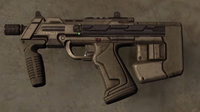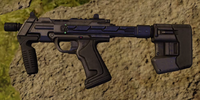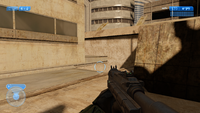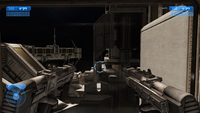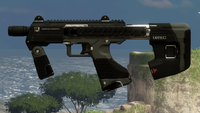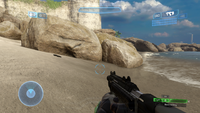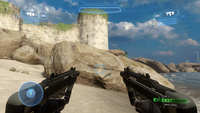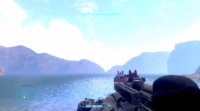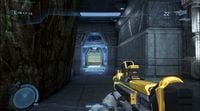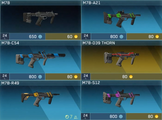M7 SMG
From Halopedia, the Halo wiki
| M7 SMG | |
|---|---|
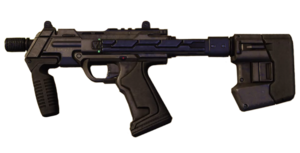 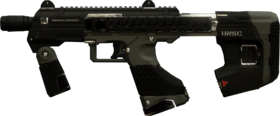 Two variants of the M7 SMG. | |
| Production overview | |
|
Manufacturer: |
|
|
Model series: |
M7 |
|
Type: |
Caseless Submachine Gun |
|
Cost: |
|
|
Variants: |
|
| Specifications | |
|
Length: |
Extended: 62.7 centimetres (24.7 in)[1][2] |
|
Width: |
6.6 centimetres (2.6 in)[3] |
|
Height: |
20.6 centimetres (8.1 in)[3] |
|
Weight: |
|
|
Ammunition type: |
5×23mm M443 Caseless FMJ[1][2] |
|
Feed system: |
|
|
Gas-operated, rotating breech | |
|
900 rounds/min[2] | |
|
427 m/s (1400 ft/s)[2] | |
|
Effective range: |
50 metres (160 ft)[2] |
| Service history | |
|
In service: |
|
- "I’ve seen a Spartan use two at once, tearing the crap out of the little ones; sending the big ones down in bloody heaps. But I guess that’s what ya gotta be to pull it off: an action-movie hero or a seven-foot-tall walking tank."
- — Anonymous E2-BAG/1/7 serviceman
The M7/Caseless Submachine Gun[2] (M7/SMG) is a personal defense weapon developed and manufactured by Misriah Armory. It is commonly used by infantry, special forces, and vehicle crews of the United Nations Space Command armed forces. A suppressed version of the weapon, the M7S SMG, is often issued to special operations personnel.[4][5]
Originally, the M7 SMG was issued solely to vehicle crews as an emergency weapon; however, the submachine gun became widely used during the Insurrection. The weapon became favored by paramilitary police units and UNSC Special Forces units for its efficiency in eliminating insurgents located in orbital habitats and cluttered urban environments. Due to this efficacy, the M7 was also popular with those same Insurrectionists. Although the UNSC began trialing a replacement for the weapon, the M7 SMG remains the current submachine gun model used by the UNSC following the Human-Covenant War.[3]
Overview[edit]
Design details[edit]
The M7/Caseless Submachine Gun is an automatic submachine gun that fires from a 60-round magazine which is placed horizontally on the left side of the weapon. Due to the odd horizontal placement of the magazine on the weapon, it can be assumed that the magazine utilizes a circular ramp where the magazine meets the breech. This rotates the horizontally stacked rounds in the magazine 90 degrees until they align with the horizontal breech. An example of this can be seen in the present day FN P90 PDW.
The SMG has a polymer pistol grip, folding fore-grip, iron sights, a collapsible buttstock, as well as a titanium body. The design of the gun is most likely inspired by the HK MP7. The SMG must be cocked before it can fire the first round. The charging handle is located on the right side of the gun and does not move during operation. Once the first round is fired, the gases from previous rounds force the breech to rotate and chamber a new round. Once the magazine is empty, the handle although not illustrated in-game, can either be pulled back and locked or it can be fully cycled after a fresh magazine has been housed. If it is first pulled back and locked, then it must be pushed forward in order to chamber a new round. The magazine release button is located between the red dots on the receiver and needs to be pressed before it can be flicked off. There is no ejection port due to the nature of the rounds fired.
The SMG has a rifled barrel that is 15 cm (5.9 in.) long.[2] This weapon can also be affixed with a M49 sound suppressor;[3] in this configuration, the weapon is designated the M7S Caseless Submachine Gun.[5] The weapon is 47.4 cm (18.66 in.) long with the stock retracted and has a maximum length of 62.7 cm (24.68 in.) when the stock is fully extended.[2]
Ammunition[edit]
- Main article: M443 Caseless Full Metal Jacket
Unlike most UNSC weapons, the M7 uses caseless 5×23mm ammunition, meaning it does not have a metallic casing surrounding the powder and sealing the bullet, propellant, and primer together. Instead of using this casing, the round uses a combustible adhesive to seal these components together. Because the adhesive and propellant are both vaporized when fired, there is no need to eject spent casings. Though not featured in-game, contemporary caseless ammunition is highly susceptible to cook-off, the accidental firing of rounds due to built-up heat in the receiver.
This feature is very beneficial. In addition to increasing fire rate by removing the extraction and ejection phases of the weapon's cycle, it reduces friction inside the magazine, one of the main causes of malfunctions in weapons. This is also conducive to dual-wielding, since the user need not concern themselves with hot brass expelled from the weapon held in the left hand. The projectile itself is jacketed in metal, usually a copper alloy in standard military ammunition, to aid in penetration of the target. Caseless rounds are actually embedded into the block of propellant, reducing their length, allowing more ammunition to be stored in a smaller space.
Variants[edit]
- M7S SMG: A variant of the M7 SMG that features an SS/M 49 sound suppressor, underslung flashlight, laser aiming module, and SLS/V 5B smart-linked scope.[6]
- One or more undesignated variants of the M7 SMG tailored to fire standard 5×23mm ammunition rather than the caseless variety.[7][8][9]
Gameplay[edit]
Advantages[edit]
Nicknamed the "bullet-hose", the SMG is one of the best close-quarters firearms due to its large 60-round magazine and hit-scan properties. Suited for close-range combat, the SMG is extremely deadly against unshielded targets and can down shielded targets within seconds if dual-wielded.
The SMG can also form part of the most effective dual-wield combos in the game. The SMG, when dual-wielded with a Okarda'phaa-pattern plasma rifle, can be a deadly combination as the plasma rifle depletes the opponent's shields with ease and the SMG rapidly tears through their health. Similar deadly combination, often referred to as the "noob combo", is dual-wielding the SMG and Type-25 plasma pistol. The charged shot from the plasma pistol will deplete the shield of the opponent and a full burst of SMG fire will tear through the now-exposed flesh and armor.
Disadvantages[edit]
As aforementioned above, the SMG received the nickname "the Bullet-Hose" due to its high rate of fire, low accuracy, and inability to be fully controlled when fired in full-auto. The SMG's primary limiting factor is its poor accuracy, which limits its use to close range. At close-quarters combat, the SMG is only outperformed by the M90 shotgun, the Type-1 energy sword, and the gravity hammer. Like most other human weapons, the SMG performs relatively poorly against shields, though this weakness is negated by wielding it in conjunction with a plasma rifle or plasma pistol. As stated before, the gun has recoil which causes the barrel to climb after continuous fire and will climb faster if players dual-wield it. This forces the players to continually move their reticule down to keep the enemy in their sights but is not a big limiting factor. This, as well as the poor accuracy can be slightly countered, using a burst-fire technique, unleashing about five bullets each pull of the trigger. It also has the problem of an extremely long reload time when dual-wielded, making it easy to be killed while changing magazines. This problem however can be solved by volley firing the weapons, so while one is reloading the other is still firing. This tactic reduces the power of having two SMGs but gives the advantage of approximately 40+ seconds of non-stop firing.
Halo: Spartan Assault and Halo: Spartan Strike[edit]
- The SMG appears exclusively in dual-wielded form.
- The maximum ammo capacity during gameplay is 300.
Changes from Halo 2 to Halo 3[edit]
- Increased accuracy, range, damage and rate of fire.
- There is now a delay before the barrel actually starts to climb.
- The player's reserve ammunition capacity is reduced from 360 to 240, and when dual wielded include single wield from 180 to 120.
- More damage per round, takes 23 shots instead of 25 to kill a fully shielded Spartan or Sangheili.
- New firing sound which sounded more powerful and beefier.
Changes from Halo 3 to Halo 2: Anniversary[edit]
- Now affected by reticle bloom
- Other stats reverted to a more Halo 2-esque state.
- Model in the campaign features a more angular design.
- Now features an accessory rail on top.
- Now has an extra reload animation when the magazine is depleted.
UNSC remarks[edit]
- “The recoil isn’t bad but the M7 itself is relatively light. Not unpleasant to shoot, but a little tricky to control—it’s all about controlling the impulse.”
- “It’s actually comparable in weight to the M6—favorably, in fact. That and not having to worry about the hot casing dropping down on your boot makes it a pretty clear choice which one I think is the better system.”
- “Yes; I have fired it one-handed with the stock collapsed and the foregrip folded. No; I was not driving at the time, I was shotgun. Did I hit anything? Don’t know—probably never will—no more bogeys afterward, though.”
- “It’s not a death ray but nobody likes getting shot. Not even Bravo Kilos. And you can fill the air with a lot of lead with an M7."
- “The M7 is the wave of the future. Hopefully the Romeo Echo Mike Foxtrots will finally realize the benefits of caseless ammunition.”
- "I’ve seen a Spartan use two at once, tearing the crap out of the little ones; sending the big ones down in bloody heaps. But I guess that’s what ya gotta be to pull it off: an action-movie hero or a seven-foot-tall walking tank."
Production notes[edit]
While the M7 first debuted in Halo 2, the concept for an SMG originated in the production of Halo: Combat Evolved. Named in-game as the "12.7mm MP-99 Para", 1999-2000-era builds of the third-person era of Combat Evolved feature an SMG which can be wielded by the player. Unfortunately, it was one of weapons cut from final release.
Trivia[edit]

|
See our gameplay information related to M7 SMG on its gameplay page. |

|
Browse more images in this article's gallery page. |
- In Halo 2, when the player wields a single M7, the SMG's stock is extended. When the M7 is dual-wielded, the stock is collapsed. In Halo 3, the stock remains locked halfway in both the first-person and third-person animations, regardless of whether the weapon is being dual-wielded.
- The circular ramp the M7 uses to feed rounds into the chamber is similar to the mechanism utilized in the real-world FN P90 submachine gun. However, the P90 uses a top-loaded magazine that feeds cased 5.7×28mm rounds horizontally.
- The fictional 'PDW-57' submachine gun featured in Call of Duty: Black Ops 2 resembles the M7 SMG especially its unique bullpup design.
- Its name is a reference to the number 7.
Gallery[edit]
Halo 2[edit]
First-person view of the M7 on Ascension.
Halo 3[edit]
A SPARTAN-II dual wielding SMGs, with an M41 rocket launcher on his back.
First-person view of the M7 SMG on Guardian.
Halo Wars[edit]
Douglas-042 and Alice-130 using M7 SMGs against Stealth Sangheili during the Battle of Trove.
Halo 4[edit]
John-117 holding the redesigned M7 SMG in the Halo 4 alpha, in a lighting test map. Note the lack of dedicated animations.
Halo 2: Anniversary[edit]
Commander Miranda Keyes wielding an M7 SMG in Halo 2: Anniversary campaign.
A Spartan using an M7 SMG on Stonetown.
Halo Online[edit]
List of appearances[edit]
Sources[edit]
- ^ Jump up to: a b c d Halo: The Essential Visual Guide, page 189
- ^ Jump up to: a b c d e f g h i j k l m Bungie.net, The M7 / Caseless SMG (Retrieved on Jan 24, 2021) [local archive] [external archive]
- ^ Jump up to: a b c d Halo Waypoint: SMG
- ^ Jump up to: a b Halo Encyclopedia (2009 edition), page 320 (2011 edition)
- ^ Jump up to: a b Bungie.net: Halo 3: ODST Guide
- ^ Halo Encyclopedia (2022 edition), page 167
- ^ Halo Encyclopedia (2011 edition), page 320
- ^ Halo Legends - The Babysitter
- ^ halo.bungie.org, Re: After my 4th viewing of The Babysitter...
| ||

